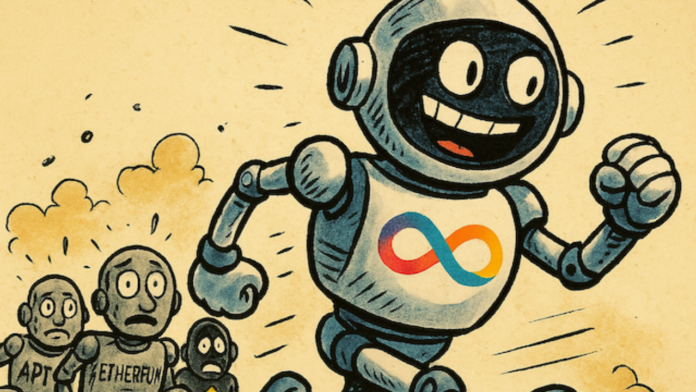The Internet Computer is churning through transactions like a high-speed train with no signs of slowing. On April 3, it processed 351.5 million transactions in a single day—compared to Aptos’s 4.3 million and Ethereum’s 1.3 million—cementing its place as one of the busiest chains in the industry.
That kind of throughput isn’t just an impressive stat on a dashboard; it points to a network that’s handling serious on-chain activity while staying accessible. According to data from Token Terminal, the average transaction fee on the Internet Computer is just $0.0001. Ethereum, by comparison, sits at $0.4566, and Aptos charges $0.0007. The contrast is sharp, especially for developers looking to deploy apps where users aren’t turned away by high fees.
While Ethereum still leads in daily revenue—$228,404 compared to ICP’s $43,073—the conversation shifts when you look at cost-to-output. Aptos, with just 4.3 million daily transactions, generates $3,064, which is 14 times less than ICP. Ethereum’s revenue is higher, but it’s built on much higher fees that often frustrate casual users and smaller builders. The Internet Computer, meanwhile, is handling 270 times more transactions than Ethereum while charging a fraction of a cent to do so.
Some may point out that high throughput alone doesn’t paint the whole picture. A good portion of ICP’s activity comes from canister smart contracts—automated and self-executing modules—running on-chain by design. Critics might argue this inflates numbers when compared to user-driven activity. But that’s part of what sets ICP apart: its infrastructure supports full-stack applications that live entirely on-chain, unlike most chains that require off-chain support.
Applications like OpenChat, DSCVR, and the rising meme-token and DeFi ecosystem suggest users are engaging with the network beyond passive staking or speculative swaps. The activity isn’t just automated noise; there’s a growing footprint of real use cases and on-chain behavior, albeit still early-stage in global terms.
This data arrives as projects like Caffeine, a decentralized Replit-style builder, prepare to go live on ICP. If successful, such platforms could attract new developers looking to deploy without the friction of writing low-level code or paying unpredictable fees. That’s the kind of onboarding layer many chains have struggled to offer without compromising decentralization or performance.
The road ahead isn’t guaranteed. Ethereum has entrenched dominance and deep liquidity. Aptos continues to experiment with parallel execution and developer tooling. But the Internet Computer is proving that a high-volume, low-cost chain isn’t a pipe dream—it’s running right now, and running fast. Whether that momentum translates into long-term developer migration or daily active users remains to be seen. But if transactions are any signal of readiness, ICP isn’t waiting for permission.


